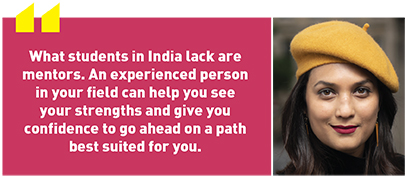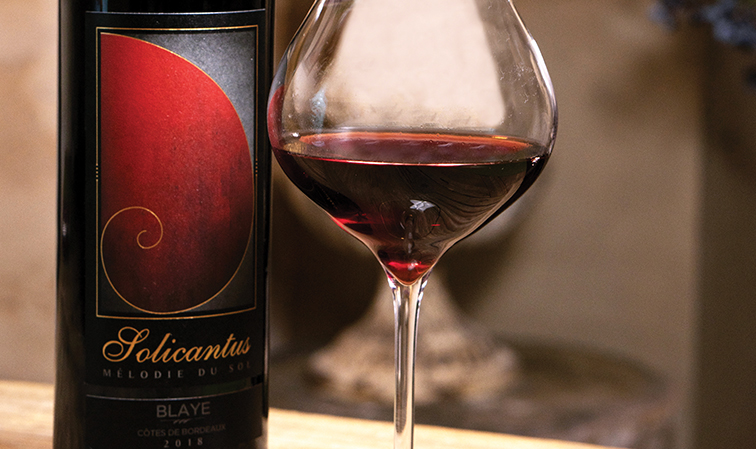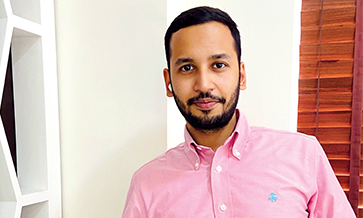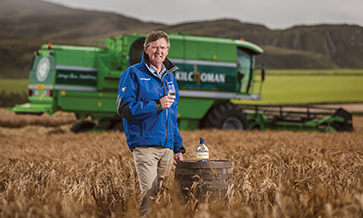Not yet 40, this woman from Bengaluru has created a French wine label, ‘Solicantus’, and is perhaps the first Indian to do so. Namratha Prashanth, with an MBA from INSEEC Wine & Spirits Institute in Bordeaux, and a WSET Level-2 certification under her belt, is now the owner of her own wines business consultancy in France. She spoke with Brews & Spirits on what makes her tick. Excerpts:
From a French language specialist, to manager and trainer for a chocolatier, to owner of your own international business consultancy, to launching your own wine label – who is the real Namratha?
There are four words that best describe me: ‘Adaptable’, ‘Ambitious’, ‘Unconventional’ and ‘Innovative’. My experiences over time have made me the woman I am today.
I’ve always had a curious mind, but the aspiration to dream big and achieve greater things was mainly because of my circumstances and my family, which provided me with unconditional support.
France is renowned for its advancement of the arts, haute couture, exotic perfumes and proud wines. How does it feel to be accepted into this elite circle of wine-makers and connoisseurs?
At a very interesting point in my life I realised it’s not about others accepting you; it’s about you. It’s about finding yourself, about realising your journey, understanding your passion, accepting your faults and embracing life.
Once I reached this stage of self-discovery, I fit in like a glove in this elite circle. Wine is a different world indeed. It’s the elegance, the people, the art, the lifestyle, the feeling of conviviality that surrounds a wine – these are the things that are most addictive.
I had a taste of French culture at Alliance Francaise in Bengaluru, where I studied French. My professor, Geetanjali Shrivastava, did a great job. So, when I landed in France my fluency helped break cultural barriers. I could make long conversations and even laugh at their jokes.
The biggest challenge I faced was being a vegetarian in France. It has been hard. Thankfully my chef’s skills come into play and the much loved curry powder, which is my mother’s secret recipe, has been a life saver. Now it has become a huge hit with the French!
What went into the making of your label, ‘Solicantus’?
The label is inspired by one of Salvador Dali’s painting that I saw in a museum in Bruges (Belgium). It’s incredible how he saw things larger than life. His mind is so complex! He used implied lines that surrounded a space in some of his paintings to convey messages, and I just loved the idea.
So I depicted the journey of a wine through the golden swirl. Then I chose the colour red to depict red wine in a vat that goes from must to a clear wine at the top. I studied extensively the influence of colour in consumer behaviour in my main markets.
The name was the hardest part. In fact, I had already created the label and I needed a name that did justice to the wine and the label. In Latin ‘Soli’ means soil and ‘Cantus’ meaning melody. It took me two months, but in the end I’m happy with the harmony that I have achieved.
Can you give us details of ‘Solicantus’?
The wine is a blend of Merlot, Cabernet Sauvignon, Malbec (in the proportion 90:5:5), aged for 18 months in French oak barrels. ‘Solicantus’ has delicately interwoven tapestry of flavours. The nose finds a generous bouquet of ripe red and black fruits with nuances of spice and notes of refined cedar.
It charms its way into the palate by delivering a rich silky mouth feel, delicious fruitiness, supple tannins and a pleasant finish. Alcohol is 14.5%.
We are going to bottle it in the end of August. There are 20,000 bottles of red available. The region or appellation is Blaye Cotes de Bordeaux. Our main markets are the US, UK, France, China and India.
Will Indians get to taste any of your wine?
Yes, India is my home country, and I have many consumers who write to me asking where they could find a bottle of ‘Solicantus’. As of now, I am keen on working with the right trade partner. Certainly, the wines will be available, but it might just take some time.
Can you elaborate on your experience of birthing a French label?
It was a chance meeting with Corinne Chevrier at the Vinexpo a few years back. After a month I met her in her beautiful vineyards. She walked by the vines, touching their leaves and explaining to me that the growing season is almost like the gestation period in women – a lot of care needs to be taken.
The harvest is like delivering a child, Corinne said. We laughed. We got on very well. She comes from a family of wine makers, in fact the fourth generation. I asked if I could learn making wine from her, and she readily agreed.
Much later I thought about the idea of bringing out a separate label. We were together working on 5 hectares, so I thought it would be interesting to bring out a separate label. I was working on branding for another client. I had gathered enough experience, so I decided to go ahead and create my own brand.
As always my friends, Robert Flynn, Roman Gazin, Nicole Takeda, Michel Duclaud and Keith Pech gave me feedback at each stage.
After your MBA, you were associated with Château Siran in Margaux. What was your experience with the renowned French wine maker?
It was after the first month of school that we were all sent off to do an internship. The French job market is tough, even worse for a foreigner! I was lucky in that sense. It was the first company I applied to and the response came immediately after the Skype interview with Edouard Miailhe.
I soon moved into a house that was situated on the premises of the chateau. The family was very welcoming. They would invite me for dinners whenever they stayed at the chateau – and always served great vintages!
The first time I went for dinner, I was shocked to see Edouard cooking and the children laying the table. In France everyone helps in the kitchen. For 5 months, living each day amongst the vines and learning from the best, Siran has by far been the best experience of my life.
You can read all about it in the book I’m writing, that will be published soon!
You established and registered your own company, ‘Wine Equation’, in Bordeaux in 2019. Can you tell us what this venture is all about?
Wine Equation encompasses all wines and wine services we are offering. In 2017, I started exploring different options in the wine investment business. After much research we tied up with Cult Wines in London offering our clients an opportunity to invest in an alternative asset class.
We also offer fine wine to individuals and manage cellars upon request. Another division of the company is involved with barrels. Wine barrels are used for ageing spirits and beer to attain complexity. We offer a large selection of barrels to distilleries and breweries.
For the events and the tours, we’re working with partners, but at the moment we’ve not been able to develop that part of the business as travel is involved. For the vineyard sales too we work with partners.
China has been ahead in acquiring many properties here. There is a lot of interest from India to invest in wineries here. There are some excellent properties on sale at the moment.
What would be the next play of Wine Equation?
At the moment we are in talks with potential investors who we would be partnering with to acquire a vineyard in Bordeaux. Our focus with our next brand would be to produce smaller quantities that would go into the super-premium segment.
How has wine making, and France in particular, treated you?
The French are very good at whatever they do. It is a privilege to learn wine making from them. I’ve found myself, my journey, my path. I feel a sense of peace within.
There are challenges, every day, both professionally and personally. Yet I have this feeling of alignment with the universe. At 37, I had to start life from scratch. My finances were zero, but my family chipped in.
My brother-in-law, Satya Kumar, who has mentored me extensively, always tells me, “Follow your passion and money will follow”. That has been by far the best advice anyone has ever given me!
As I mentioned earlier, you can read more about the story in my book that is soon to be released.
As a woman, what challenges did you face in your journey from student to Managing Director of Wine Equation?
I think the biggest challenge as a woman for me was to stabilise my situation professionally before I move my daughter to France. So I put all my efforts into networking with people. This was the foundation.
Then it was a lot of paperwork – the French love paperwork! I had to get the correct visa, present a viable business plan, figure out legal formalities for the company as a foreigner and push business for revenues – all at the same time.
I also had to constantly stay in touch with my family in Bengaluru, especially making sure I didn’t lose that beautiful bond I share with my daughter, Shloka.
In France, more women are getting into the alcohol business. But I am an Indian woman. Initially, everyone thought I would not succeed, and that I would return to India because I had a child there. They didn’t take me seriously.
My plans were too big for them and impossible to achieve. But I was determined, and my daughter gave me the strength to go on.
As a student, what made you take up French and German language studies?
In 2007, I was slowly slipping into post-natal pregnancy depression. That’s when I decided to learn something new to keep my mind occupied. I started learning through online videos. When my child turned one, I went to classes at the Alliance Francaise, close to home in Bengaluru.
My husband’s family didn’t believe in working women; they were not comfortable with me studying either. So I took covert trips to the school for a long time before they realised it.
At that time I had no idea I would land up in France! Once I started enjoying French, I was motivated to learn German also, so I could make basic conversations with my Frankfurt-based uncle and his wife, Aunty Ulrike, who doesn’t speak English.
Your stints with chocolatiers/bakers in Bengaluru were baby steps after graduating in hotel management. As a 20-something, what were the lessons you took home from the experience?
It was in 2009 that I got a part-time job in a chocolaterie, ‘Bliss Chocolates’. It was my first job after marriage. I had a lot of resistance at home. Vimal Sharma, who is the owner, had given me a lot of flexibility. He let me choose the time and the days I worked.
He was extremely empathetic with working women. Perhaps it was cultural because he came from Australia. His vision for Bliss Chocolates was very big, but nobody understood it at that time.
Today the name is changed to ‘Smoor’ and it has gone from one chocolate lounge to several more across the country. It definitely helps to think big and work hard to achieve it.
What was the level of awareness about wines in India at the time? What were the wines available in India (you tasted) then? In retrospect, how good/bad were they?
My professor in hospitality, Bobby George, introduced me to wine in the year 2000. His classes in service were always very enriching and humorous at the same time. So students looked forward to attend his sessions.
In those days people in the alcohol scenario were rarely respected, let alone women. The word ‘wine’ was associated with the roadside “wine store” that served cheap alcohol. It’s a pity that it’s still that way.
When I met with friends for social drinking, I always tried to order a glass of wine. But most restaurants didn’t have wine on their list, other than the upmarket restaurants and hotels. I remember tasting a wine that felt like I was drinking pesticide!
How has the wine scene in India changed, and why? What does your crystal ball say about the future of wines in India?
Benjamin Franklin once said, “Wine makes daily living easier, less hurried, with fewer tensions and more tolerance.” This can be seen in two different ways. It could mean the person is alcoholic, or it could mean the cultural aspect of wine.
Wine is not about getting drunk, it is far from it. Opening a bottle and sharing a glass or two with friends and family can be such a pleasurable experience. Light-hearted conversations at a table by the fireplace, classical (French) music playing in the background, the wonderful dishes paired with it, all of it can be very de-stressing after a hard day’s work.
And this is what Indians are appreciating now. I find wine everywhere, new brands, local and international. Wine consumption is only going to grow in the next decade. Look at what’s happening to the post-Covid world: every wine maker is accessible online now and that’s incredible.
In India today the largest segment of wine consumers is women. There’s an array of good wines available in plush stores with great ambience, where women can walk in and buy their bottles without any stigma – that is a huge change!
What led you to pursue your WSET certification (Level 2) from Singapore? In what way has your MBA (from INSEEC Wine & Spirits Institute in Bordeaux, France) helped in your journey?
Before I had decided to do an MBA in wine at INSEEC in 2017, I realised that I would be better off to begin this adventure with some level of formal wine understanding. Singapore was offering WSET-2 and it included around 50 wines to taste and train the palate!
Moreover it was a short flight and I got to meet all my friends who had moved there. The MBA at INSEEC was an excellent platform for mostly networking. I knew this in advance, thanks to my senior, Selvan Appadurai. He had prepared me well before I got to France.
What path of studies and streams of specialisation would you recommend to upcoming entrants to the wines sector?
Like I said before, the world is open now. Students need to make the most of this. I didn’t have the comfort of learning from home. There was always a mind block. After Covid we have all learnt to adapt.
There are numerous courses being offered in the field of beverages. There’s WSET, sommelier certifications, Champagne certifications, Burgundy wine certifications, Italian wine scholars, etc. There are a ton of possibilities.
What students lack are mentors. I think that is the most important stage of one’s career. A mentor, an experienced person in your field, can help you see your strengths and give you confidence to go ahead on a path best suited for you.
If you do not have one, reach out to whom you think can help you. Linkedin is a great platform for that. Once you have a clear vision, put all your efforts in achieving that goal.
I had the privilege of Cathy Huyghe and Richard Bampfield mentoring me from time to time. It’s all about the balance you achieve. Seek help if you need to. Take the time to enhance your Linkedin profile and connect with as many professionals in your field. It doesn’t cost anything and it brings a ton of value to your professional life.
To connect with Namratha write to her at namratha@wine-equation.com.














